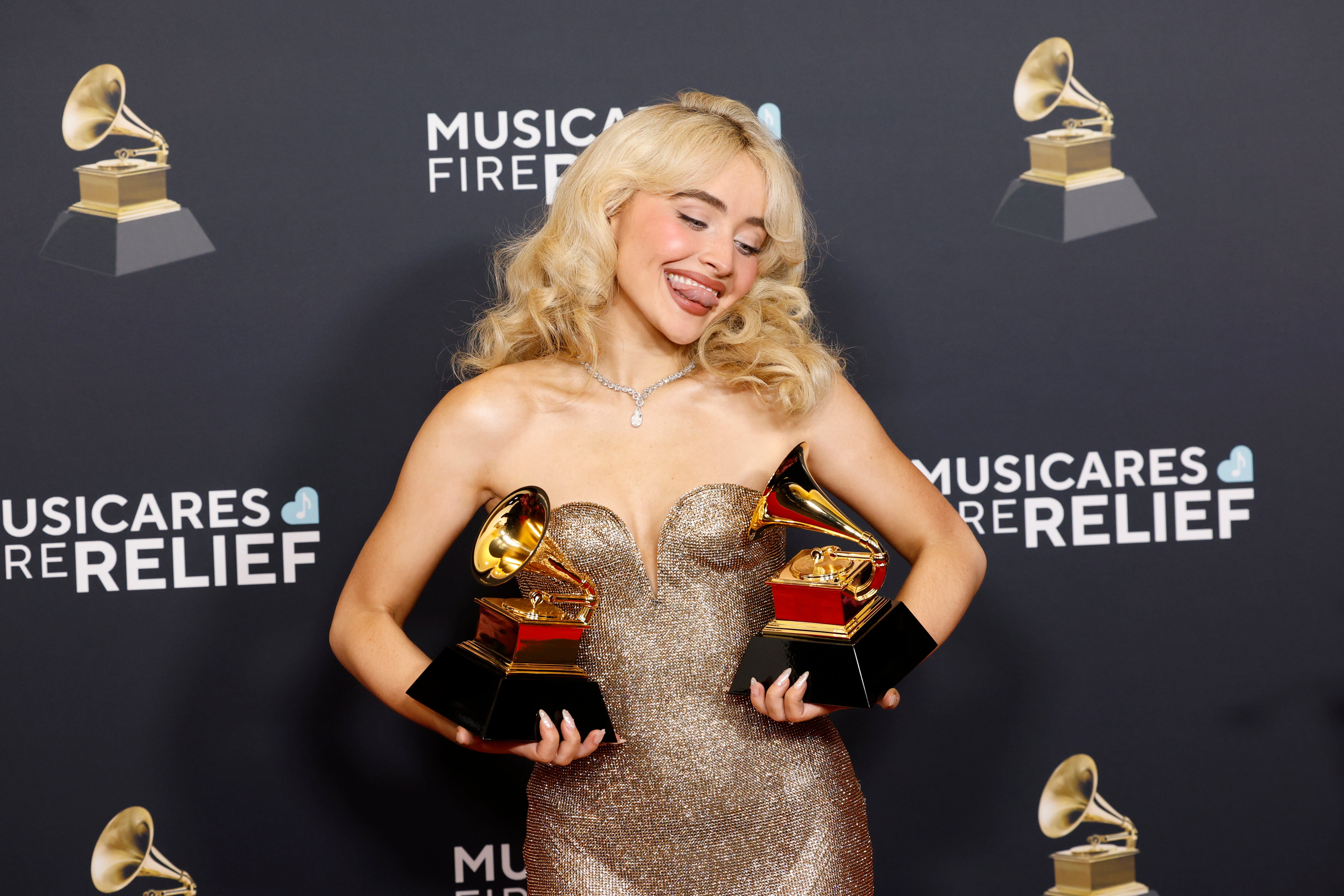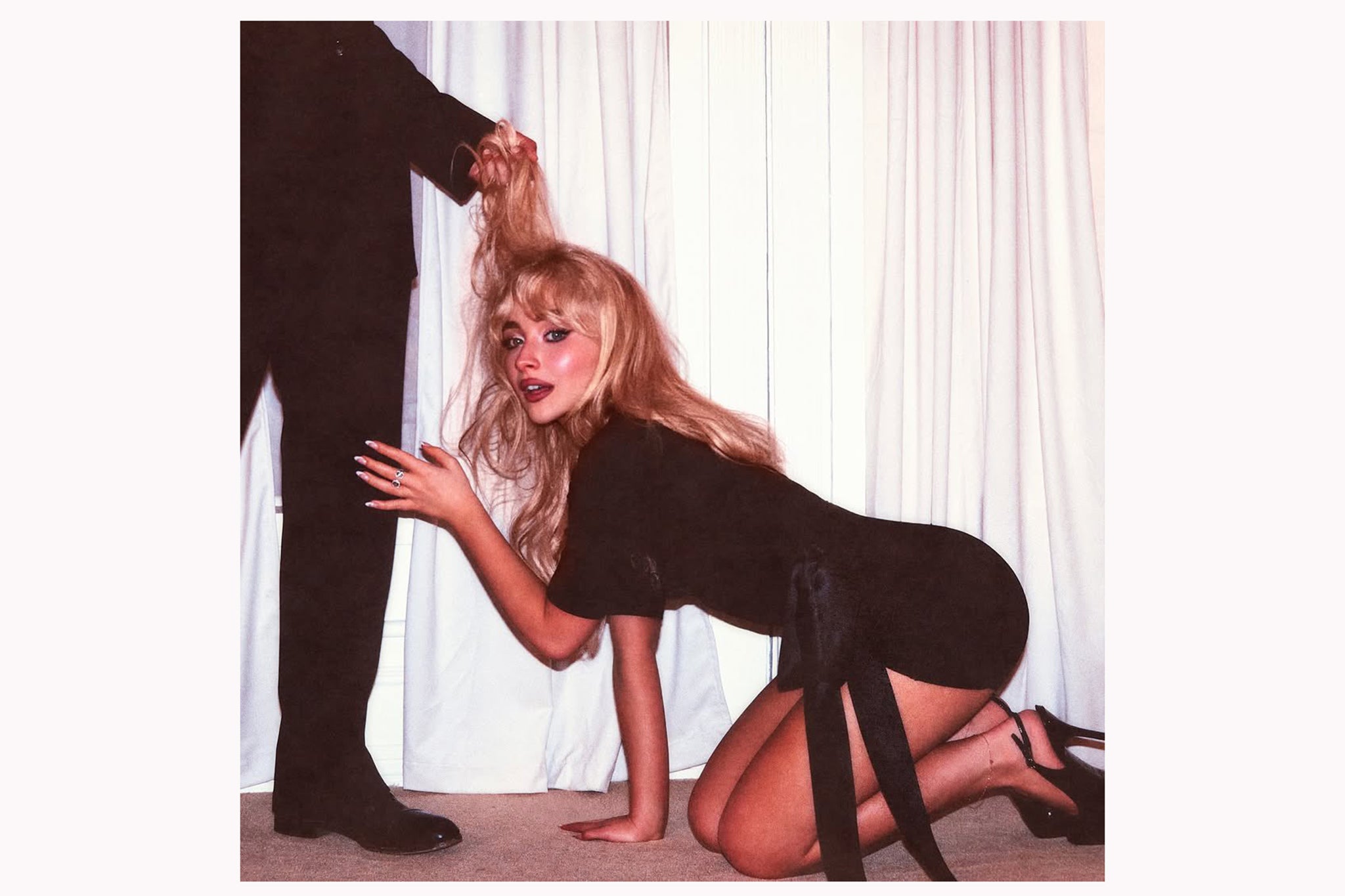Some people know me for, I guess, being explicitly horny, but it’s actually not as simple as that,” said a minidress-wearing Sabrina Carpenter during her Tiny Desk show last year. That sentence perfectly sums up the polarising yet delicious “if you know, you know” dichotomy of the Sabrina Carpenter Brand. To the uninitiated, they may see a 26-year-old woman dressed in her signature diamante bustiers, suspenders and platform heels every shade of the pastel rainbow – complete with her blonde bombshell Brigitte Bardot-style hairdo and theatrical gasps – and take her at face value. They may also have seen the scandalised headlines surrounding the cover of her new album, Man’s Best Friend, which shows the singer on all fours as a male figure tugs at a clump of her signature locks – an image that was swiftly branded “degrading towards women” and “disgusting” by her critics.
As Carpenter put it, though, it’s just not that simple.
This is an artist who is layered, meticulously and intelligently so. Carpenter’s clever world is filled with self-deprecatory comedy, tongue-in-cheek theatrics, thinly coded euphemistic lyricism and Broadway-style dance moves. Onstage, she plays into the ditsy blonde archetype (when I saw her perform in London this year, she feigned doltishness as she bluntly asked the crowd: “So, you guys like tea?”). Carpenter will also take viral moments and satirise them: she responded to the backlash to her new album cover by releasing a more demure alternative to her album artwork that she quipped was “approved by God”. Not only is she in on the joke – she’s the one making it. In a pop landscape that is plagued by over-earnestness and a tiresome obsession with appearing authentic, Carpenter is the antithesis.
A child actor who had her breakthrough on the Disney spin-off Girl Meets World, the Pennsylvania-born prodigy began posting YouTube covers and releasing teen bops when she was just 15, before swapping the Disney-owned Hollywood Records for Island and releasing her first grown-up album, Emails I Can’t Send – which showcased her vulnerable side – in 2022. By 2023, following a viral love triangle scandal involving Olivia Rodrigo (more on that later), Carpenter was co-signed by pop’s high priestess, Taylor Swift, as a support act on her mammoth Eras tour. Now a winner of two Grammys – for her blockbuster 2024 album Short n’ Sweet – she has emerged from the Disney chrysalis as one of the biggest forces in the industry.
But Carpenter’s moment in the spotlight has been 10 years in the making. Prior to the release of her career-making album, Carpenter had already released five records before she was 25. In many ways, she was built for this moment in the spotlight. Mikael Wood, a pop critic at the Los Angeles Times, tells me that timing is everything. “When the camera sort of turned around to be on her, she had already developed a kind of showbiz acumen that meant she was able to deliver.”
Carpenter is also a “machine”, both on and off stage, according to Rachel Chinouriri, a British indie singer-songwriter who supported the European leg of Carpenter’s Short n’ Sweet tour earlier this year. “On tour, I realised she is born for this, and the reason she’s at this level is because of who she is behind the scenes,” says Chinouriri, who adds that Carpenter had time to speak to all of the cast and crew during the run. “When you speak to her one-on-one, she will make sure you are the only person who gets her focus, and it makes you feel heard and really special. It’s a beautiful part of her aura. She is driving an enormous ship, and she’s driving it very bloody well.”
That professionalism might have come from Carpenter’s training as a child star – but she didn’t stick to the Disney script for long. She may have looked at her predecessors who also left acting for music – Miley Cyrus, Selena Gomez, Demi Lovato and the Jonas Brothers – and decided to do things slightly differently much sooner. “There’s a lot of filler on those early records from Miley, Demi, Selena and Jonas Brothers records,” says Wood, “because they were in the business of selling merchandise and lunchboxes, and they were just pumping out these albums.” Carpenter’s Short n’ Sweet was decisive in both its aesthetic and messaging by comparison. “She realised that there’s an advantage to make a really tight, concise and consistent album that doesn’t feel like another piece of Disney marketing.”
Woods argues that the “Please Please Please” singer filled in the gap in the pop market for someone who has a “risque sense of humour and wants to write about sex in a funny, bold and fearless way”. Take her extremely forward lyrics in “Juno”, a frisky track inspired by the 2007 teen pregnancy film of the same name, she sings: “If you love me right, then who knows?/ I might let you make me Juno.” Or look to her honeyed disco hit “Espresso”, where the caffeinated drink is a metaphor for Carpenter’s sexual allure, as she chimes: “Say you can’t sleep, baby, I know/ That’s that me espresso.”
That’s what was missing from the pop scene. Sure, plenty of singers will chronicle their sexual desires – but Carpenter’s approach makes her stand out. “I find the way that Sabrina discusses her own pleasure is very inspiring; it’s just so unabashed. There’s no sense of shame,” says Wood. “It’s about wanting to have a good time in a very empowered way.”
And then there’s Carpenter’s unmistakable flirtatious personality and sartorial aesthetic that has hues of Marilyn Monroe and Betty Boop combined. “She’s a classic old Hollywood star,” says Wood. “Her sense of humour, that sort of screwball comedy aspect, goes back to the Thirties and Forties."
There is nothing earnest about Carpenter’s brand, either. And that’s what makes it stand out in a hyper-serious pop landscape, according to music industry executive Nikki Camilleri. She points towards Carpenter’s theatrical asides when she’s performing onstage, or her comedic appearances on Saturday Night Live, that have helped shape her persona. “Sabrina will always give the audience a wink,” says Camilleri, “which makes us feel like we’re also in on the joke and pulls you in further.”
The most successful modern pop stars right now, then, are the ones who are least polished, but perhaps the most avant garde. Artists like Carpenter, as well as “Pink Pony Club” singer Chappell Roan, have brought back the spectacle that pop has been lacking. “I think those artists surveyed the landscape and said, ‘You know what, it’s been eight to 10 years now of kind of downcast, sort of mumbly Lorde and Billie Eilish core, let’s bring some of the pageantry back, let’s bring choreography back,” says Wood.
Theatrics, both on and off stage, have become part of Carpenter’s call-and-response. She’s become an expert on capitalising and deconstructing viral moments, even when she’s pulled into the spotlight for the wrong reasons. In 2021, Carpenter acquired post-Disney fame when she became persona non grata among some pop fans after she was identified as the “other woman” in Olivia Rodrigo’s breakout single “Drivers License”. The attention surrounding the love triangle between Rodrigo, her ex-boyfriend Joshua Bassett, and Carpenter – all three of them ex-Disney – allowed Rodrigo to establish herself as a grungy pop princess, while Carpenter used it to restyle herself as an outspoken woman unapologetic for her romantic decisions. The events inspired Carpenter’s 2022 song “Because I Liked a Boy”, in which she sang, “I’m a homewrecker, I’m a slut/ I got death threats filling up semi-trucks … All because I liked a boy.”

Carpenter’s ability to analyse relationships and express her disappointment with the poor calibre of men on offer, then, has become another feather in her boa. Take the putdowns in the song “Manchild”, on her new album, when she calls out her lover’s lack of brain cells, singing: “Never heard of self-care/ Half your brain just ain’t there.” The pop star strikes a careful balance between not hating on her male subjects, but illuminating a shared experience. “Sabrina has leaned into how a lot of women feel,” says Camilleri, “in that they’re cynical about dating and her music is more a product of the times.”
The backlash to the Man’s Best Friend album cover worked in Carpenter’s favour, too. While her critics argued that her pose suggested that she was subservient or submissive – which they saw as especially harmful when a portion of her fanbase are children – it only further fed into her knowingness that has become intrinsic to her brand. People who criticised the artwork simply misunderstood her brand and messaging. “To be outraged by it, you have to assume that Sabrina isn’t in on the joke, which just seems like, have you never listened to Sabrina Carpenter?” Wood says.

But Carpenter is electing herself to play with ideas about gender roles at a particularly hostile time when women’s rights are threatened by conservative or far-right values. Some critics think her timing isn’t right. “A lot of people don’t want to hear this kind of satire at a moment when it feels like women are being steered by oppressive structures in politics and culture,” says Wood. “It’s a risky moment to do this kind of humour, but it’s worth doing.”
An artist will always know their fanbase the best, says Chinouriri, who released her critically acclaimed debut album What a Devastating Turn of Events last year. “Some people will say that Sabrina’s fanbase is for kids, but I saw all the shows – as an artist, you make the art that represents you and yourself. She’s not a child, she’s a 26-year-old woman. I think it will be at the fault of whoever’s reading the lyrics and still being offended by it.”
Chinouriri says that art and music are all about subverting narratives – and Carpenter knows exactly what she’s going for. “Art is meant to move things,” she says. “If your music isn’t causing that much conversation, then what are you doing?”
‘Man’s Best Friend’ is out now







